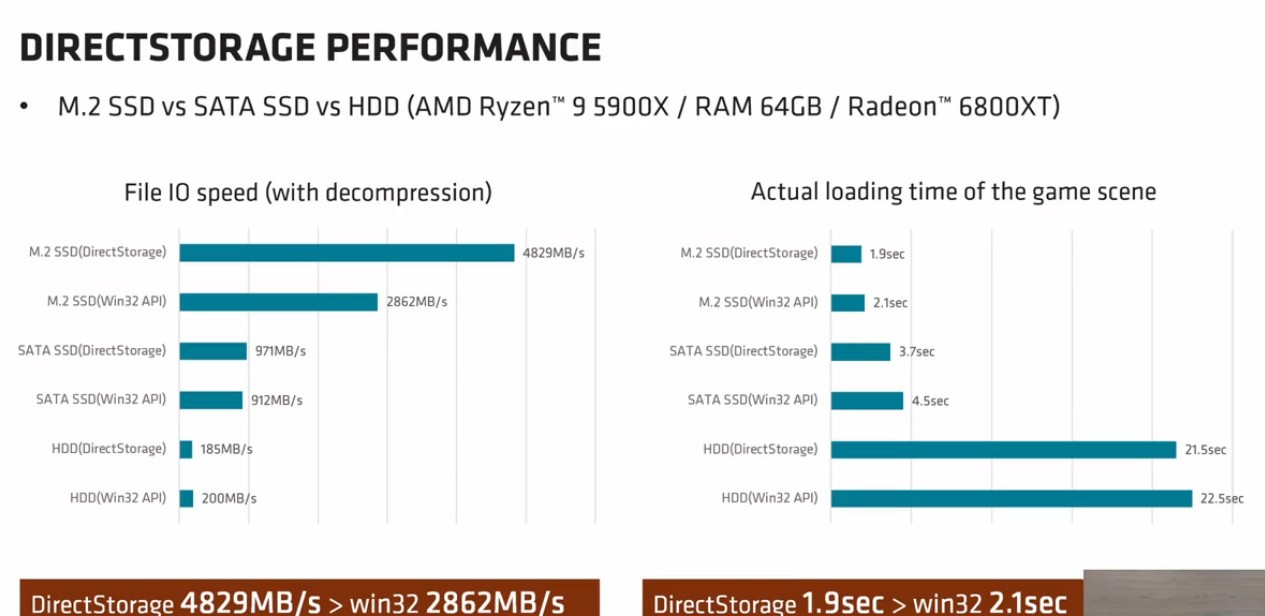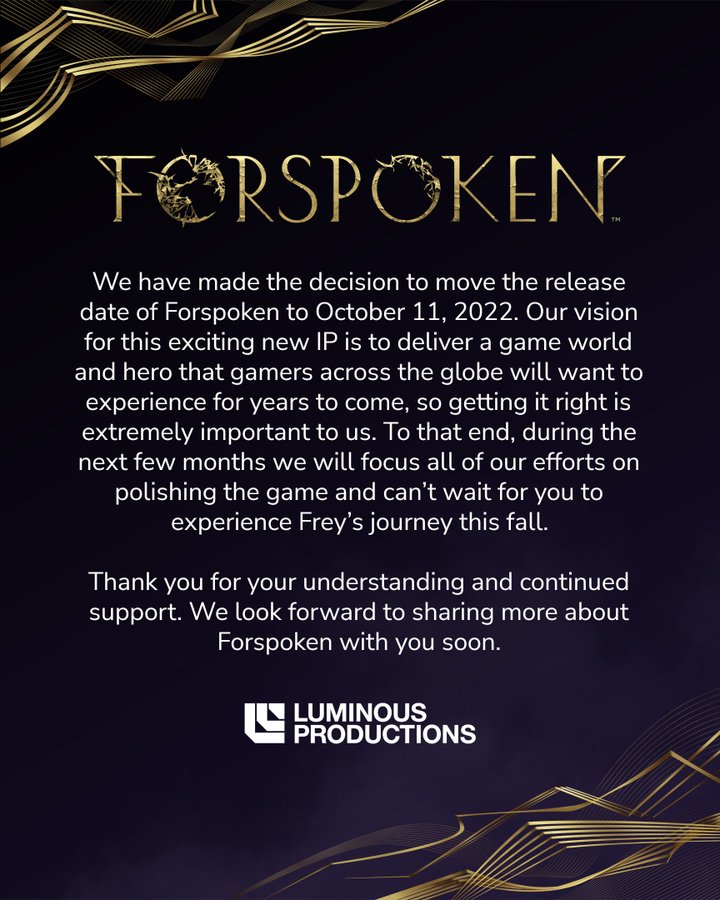DirectStorage Reduces 'Forspoken' Load Times to Less Than Two Seconds
Open-worlds now load faster than you can sneeze.

Game developer Luminous Productions recently announced that its upcoming game, Forspoken, would be one of the first available titles supporting Microsoft's DirectStorage technology. Today, Luminous' Technical Director, Teppei Ono, took to a video partly published online to showcase the performance improvements one can expect from the usage of the new DirectStorage subsystem. Complex scenes made up of around 20,000 files (weighing in at 4.5 GB) only took 1.7 seconds between shifting from the loading screen towards Forspoken's impressive open world.
The video presentation showed two different scenes being loaded across different storage subsystems: an M.2 SSD, SATA SSD and HDD. The configurations were tested under both the new DirectStorage API as well as the classic (and soon deprecated) Win32 storage subsystem.
As the video highlights, not all storage is equal. Even the slowest of our SSD picks would wipe the floor with the HDD being used to load the game, irrespective of DirectStorage being enabled or not. In scene one with DirectStorage enabled, an M.2 SSD took 1.9 seconds to load the scene using DirectStorage. This performance was followed by the SATA SSD at 3.7 seconds - more than double the interval - while the HDD apparently had to locate its own spinning discs first, taking 21.5 seconds.
Luminous shared additional data on throughput for the different storage solutions for this first scene, and the results are eye-opening. Using the DirectStorage API, the M.2 SSD posted an impressive 4,839 MB/s throughput. That same drive under the Win32 API delivered almost half that, at 2,826 MB/s.
It does look like there's a bottleneck still at play here: one might expect load times to be impacted on a similar ratio as throughput, but this isn't the case. A 71% increase in SSD throughput in DirectStorage compared to Win32 only delivers a 0.2 second improvement (around 10%) in load times, reducing it from 2.1 seconds to 1.9 seconds.

One reason for this could be that Forspoken it hitting a CPU wall still, despite the improvements brought by DirectStorage. Perhaps the sill missing GPU acceleration component, which Microsoft is still working into DirectStorage, could improve things further. The developers believe that they'll ultimately be able to bring load times to under one second, though this should best be expected as the exception, not the rule.
Scene two does offer the fastest load times. It still shows largely the same performance proportion between all three storage solutions: the M.2 SSD clocked in at 1.7 seconds while the SATA drive took 3.2 seconds. The HDD predictably crossed the finish line in last place at 19.9 seconds.
Get Tom's Hardware's best news and in-depth reviews, straight to your inbox.
Forspoken was previously scheduled for a May 25th release, but a recent delay moved that date by five months to October 11th. If only the Forspoken release itself could benefit from DirectStorage too.


Francisco Pires is a freelance news writer for Tom's Hardware with a soft side for quantum computing.
-
hotaru.hino I thought DirectStorage and the like was meant to help reduce load times or pressure while in-game, rather than the initial load, so large amounts of assets can be shifted around "instantly" rather than needing something like a loading hallway or whatnot.Reply -
salgado18 Reply
It is that, too. But if it does one, it should do the other too.hotaru.hino said:I thought DirectStorage and the like was meant to help reduce load times or pressure while in-game, rather than the initial load, so large amounts of assets can be shifted around "instantly" rather than needing something like a loading hallway or whatnot.
I'm actually thinking if it could be useful in allowing higher-quality assets on a scene, since you can now load from disk only a room or area at a time, postponing the loading of the next room to when you open the door. That could be a big improvement. -
hotaru.hino Reply
In the case of initial loading like what this test was showing, the CPU is just as responsible as the storage speed for determining the loading time, and PCIe 3.0 drives pretty much hit the "CPU wall" as mentioned in the article. Like if you think about it, Windows typically uses about 1.5GB-2.0GB of RAM after booting (assuming we have a fresh build). If loading were really all about shuffling data around, Windows should load in less than a second from a PCIe SSD. But it doesn't.salgado18 said:It is that, too. But if it does one, it should do the other too.
I'm actually thinking if it could be useful in allowing higher-quality assets on a scene, since you can now load from disk only a room or area at a time, postponing the loading of the next room to when you open the door. That could be a big improvement.
Though having another go at thinking about this, this game may be loading only just enough assets to get you going and it loads in the rest later. -
cryoburner Title:Reply
DirectStorage Reduces 'Forspoken' Load Times to Less Than Two Seconds
Actual Content:
A 71% increase in SSD throughput in DirectStorage compared to Win32 only delivers a 0.2 second improvement (around 10%) in load times, reducing it from 2.1 seconds to 1.9 seconds.
So, "technically true", at least with that exact hardware, in that specific area of the game, but the title is rather deceptive. Lowering the load time from 2.1 seconds to 1.9 seconds should make for an imperceptible difference, and is not exactly headline-worthy. And we don't even know if that "less than two second" load time is even representative of typical load times in the game, as these are marketing materials from the game's developer.
If DirectStorage had cut the load time in half, that could be more notable, though even going from a two second load time down to one second wouldn't make much of a difference, since it was already rather low to begin with. Even the SATA SSD's 3.7 seconds wouldn't be much of a concern. Or if it reduced stutters and pop-in while playing the game, though that might be more difficult for their marketing department to convey. Since it sounds like it can run from a platter-based drive, the differences from one SSD to another will probably be rather insignificant though. -
USAFRet And elsewhere...Reply
https://arstechnica.com/gadgets/2022/03/directstorage-speeds-up-load-times-in-pc-game-demo-but-hardware-matters-most/